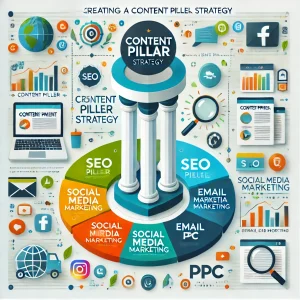In today’s fast-paced digital era, businesses are constantly seeking ways to adapt to the ever-changing landscape of online marketing. Marketing strategies have evolved significantly, thanks to technological advancements, social media platforms, and data analytics tools that allow businesses to fine-tune their campaigns for maximum effectiveness. This article will explore the importance of marketing strategies, how digital campaigns have reshaped traditional methods, and how businesses can unlock the full potential of their digital marketing efforts.
1. Introduction: The Importance of Marketing Strategies
Effective marketing strategies are crucial for businesses looking to connect with their target audiences and build long-term relationships. A well-crafted marketing way enables businesses to stand out in a crowded market, communicate their value proposition effectively, and drive meaningful customer engagement. With the rise of digital platforms, marketing strategies have evolved to incorporate new tools and channels, allowing businesses to target specific segments with more precision than ever before.
The digital transformation has made marketing strategies more data-driven and personalized. Digital campaigns, in particular, offer unique advantages like real-time feedback, measurable results, and the ability to scale with ease. However, creating successful marketing strategies requires a deep understanding of consumer behavior, technological tools, and the ever-changing digital landscape.
2. The Digital Shift: A New Era of Marketing Strategies
The rise of the internet, social media, and mobile technology has reshaped traditional marketing methods. Traditional marketing relied on broad, one-size-fits-all messages through channels like television, radio, and print. However, today’s marketing way is more segmented and targeted. Digital campaigns are highly personalized, allowing businesses to deliver tailored content to their audiences based on interests, behavior, and location.
Key Elements of Digital Marketing Strategies
To develop effective marketing strategies, businesses need to understand several key elements that contribute to successful digital campaigns:
- Social Media Marketing: Platforms like Facebook, Instagram, Twitter, and LinkedIn are essential for reaching and engaging with specific audiences. Social media allows brands to create two-way communication, where customers can interact directly with the brand.
- Search Engine Optimization (SEO): SEO is critical in making sure a brand’s website ranks higher on search engines like Google. A well-executed SEO strategy helps businesses get more organic traffic to their website, increasing visibility and driving conversions.
- Content Marketing: Content marketing focuses on creating valuable, relevant, and consistent content that attracts and engages a target audience. Content such as blogs, infographics, and videos helps build trust and authority in the market.
- Email Marketing: Email marketing remains one of the most effective ways to communicate with a target audience. Personalized email campaigns can nurture leads, drive sales, and retain customers.
- Pay-Per-Click Advertising (PPC): PPC ads are an excellent way to drive traffic to a website. Platforms like Google Ads and Facebook Ads enable businesses to bid on keywords and serve ads to users based on their search queries and behaviors.
3. Data-Driven Marketing Strategies
One of the most powerful advantages of digital marketing is the ability to collect and analyze data in real-time. Businesses can track every click, view, and interaction, providing insights that allow them to optimize their marketing strategies for better results. By leveraging tools like Google Analytics, social media analytics, and customer relationship management (CRM) systems, businesses can make data-driven decisions that improve campaign performance.
The Role of Data in Marketing Strategies
- Customer Segmentation: Data helps businesses segment their audience based on demographics, behaviors, and preferences. This allows for more targeted and relevant messaging that resonates with specific groups.
- Campaign Optimization: Real-time data allows businesses to adjust their campaigns as they run, ensuring they can capitalize on successful strategies while abandoning ineffective ones.
- Performance Metrics: Using KPIs (Key Performance Indicators) like conversion rates, click-through rates, and engagement metrics, businesses can measure the success of their campaigns and optimize for better ROI.
4. The Role of SEO and Content Marketing in Digital Campaigns
Search Engine Optimization (SEO) is a foundational aspect of digital marketing strategies. Without effective SEO, even the best marketing strategies can fall flat, as websites may remain buried in search engine results. SEO encompasses various tactics, including keyword research, on-page SEO (content optimization), and off-page SEO (backlink building).
SEO in Marketing Strategies
- Keyword Optimization: One of the most crucial elements of SEO is choosing the right keywords. By understanding what terms and phrases customers are searching for, businesses can tailor their content and optimize their websites to rank higher on search engine results pages (SERPs).
- User Experience (UX): Google and other search engines prioritize websites that offer excellent user experience. Fast loading times, mobile-friendly design, and intuitive navigation are all factors that influence a website’s SEO ranking.
Content Marketing in Marketing Strategies
Content marketing works hand-in-hand with SEO. By creating high-quality content that addresses the needs and questions of their target audience, businesses can improve both engagement and SEO rankings. Blogs, white papers, videos, and case studies are all examples of content that can drive traffic, generate leads, and build brand authority.
5. Social Media Strategies: Engaging the Modern Consumer
Social media platforms have become essential for modern marketing strategies. With billions of users across platforms like Facebook, Instagram, LinkedIn, and TikTok, businesses can leverage social media to engage with their audience on a personal level. Social media marketing offers opportunities for customer interaction, brand building, and content distribution.
Effective Social Media Marketing Strategies
- Targeted Ads: Social media platforms allow businesses to create highly targeted ads based on factors like age, location, interests, and behaviors.
- Engagement: Responding to comments, messages, and mentions fosters a relationship between brands and consumers, leading to increased loyalty and trust.
- Influencer Marketing: Partnering with influencers who align with a brand’s values can significantly amplify a digital marketing strategy‘s reach and credibility.
6. Marketing Automation and Its Impact on Digital Campaigns
Marketing automation tools enable businesses to streamline their marketing strategies by automating repetitive tasks such as email campaigns, social media posts, and lead nurturing. By automating these processes, businesses can save time, reduce errors, and ensure consistent communication with their audience.
Popular Marketing Automation Tools
- HubSpot: Offers a comprehensive suite for email marketing, lead management, and analytics.
- MailChimp: Provides email marketing and automation features for small businesses.
- Hootsuite: Enables businesses to schedule and manage social media posts across multiple platforms.
7. Measuring the Success of Digital Campaigns
To fully unlock the potential of digital campaigns, businesses need to measure the effectiveness of their marketing strategies. Key metrics to track include:
| Metric | Description |
|---|---|
| Conversion Rate | Percentage of visitors who complete a desired action (e.g., purchase, sign-up). |
| Click-Through Rate (CTR) | Percentage of people who click on an ad or link out of the total number of views. |
| Return on Investment (ROI) | Measures the profitability of a campaign. |
| Engagement Rate | Measures how actively involved users are with content (likes, shares, comments). |
8. Conclusion: Unlocking the Full Potential of Digital Marketing Campaigns
Mastering marketing strategies and leveraging the power of digital campaigns is essential for businesses to stay competitive in today’s market. By embracing tools like SEO, content marketing, social media, and data analytics, companies can create highly targeted, data-driven campaigns that resonate with their audience and drive real results.
As digital platforms continue to evolve, so too should your marketing way. By staying adaptable and informed about the latest trends and technologies, businesses can continuously optimize their campaigns for success.



Leave a Reply